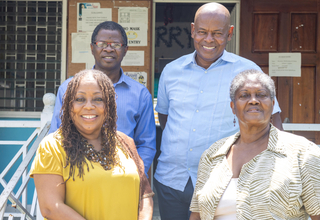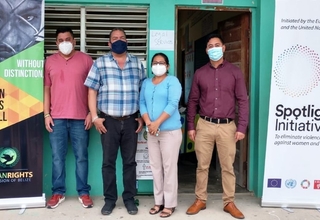The temperature in the Antenatal and Postnatal Care Clinic at the Port of Spain General Hospital is ice cold and stands in stark contrast to the warm faces of the midwives; poised, eager, and ready to be of service. Yet, it takes Angelica three tries before she sets foot inside to ask for help.
‘Sometimes people need to test the waters… too many have felt the brunt of discrimination within our public health system. They need to take the time to build back trust.’ - Midwife
The antenatal and postnatal care programme, entitled Improved protection for vulnerable populations in Trinidad and Tobago through enhanced access to sexual, reproductive, maternal, neonatal and child services is run by UNFPA’s implementing partner, TTAM. It is expected that the programme will improve the sexual and reproductive health (SRH) outcomes of vulnerable women and girls through their access to comprehensive antenatal and postnatal SRH services. TTAM will also focus on increasing GBV awareness amongst its clientele through outreach programmes coupled with the dissemination of knowledge products on family, and intimate partner violence. Where applicable, TTAM will also refer persons to multi-sectoral services as needed.
To date, the programme has been in existence for six months, and its impact is palpable. Over 300 copies of antenatal and postnatal care brochures have been disseminated at the Port of Spain clinic and over 150 persons have come forward to access care. One particular person; Angelica, a 21 year old Venezuelan refugee sings their praises. Pregnant with her second child, she has become one of TTAM’s fiercest advocates, after receiving life-saving information on how to care for her 3 month old daughter.
‘Imagine being pregnant with your first child; in a foreign country with no family or friends to support you. Imagine going to the hospital for the first time to give birth and the only word that you manage to understand, as you are being escorted off the premises, is ‘ deportación!’’
This was Angelica’s traumatic first attempt at accessing services within the public health system.
Then, imagine having a three month old baby who suddenly stops feeding and you no longer know what to do. Imagine, finding the courage to go back to the hospital to ask for help, and to your relief, you find support. -- This too, is Angelica’s story.
With the implementation of TTAMs antenatal and postnatal programme, Angelica now affirms that it provides a safe space for pregnant Venezuelan refugees and is looking forward to receiving guided support throughout her second pregnancy.
“When I get to the clinic I can’t tell you how safe I feel when she speaks in Spanish. The fact that she is taking the time to try speak to me in a way that I understand makes me feel cared for’ - Angelica
In an effort to ensure quality of impact, TTAM has focused on training their midwives to respond to the needs of the most vulnerable refugees and migrants through a participatory approach to learning. Their training workshops for healthcare providers have focused on the ‘do no harm principle’; the survivor-centred approach to care; understanding the cultural nuances of communicating with Venezuelan refugees and an orientation on the Policy for Treating with Non-Nationals with respect to the Provision of Public Health Care Services. In addition, TTAM’s intentional hiring of a qualified Venezuelan refugee to design and teach the module on cultural and language nuances is noteworthy and shows their commitment to centering the voices of affected populations.
‘Meaningful participation of crisis-affected persons is essential to ensuring the relevance, and effectiveness of an initiative. Moreover, it fosters opportunities to preserve and respect a person’s dignity and right to determine their own lives.’
From all accounts, this project is off to a good start!
Angelica* name changed to protect identity




